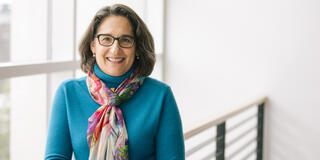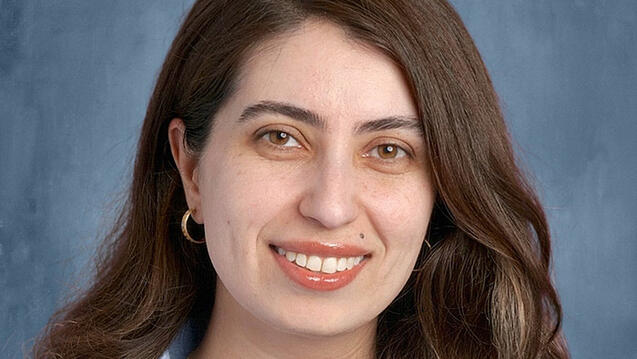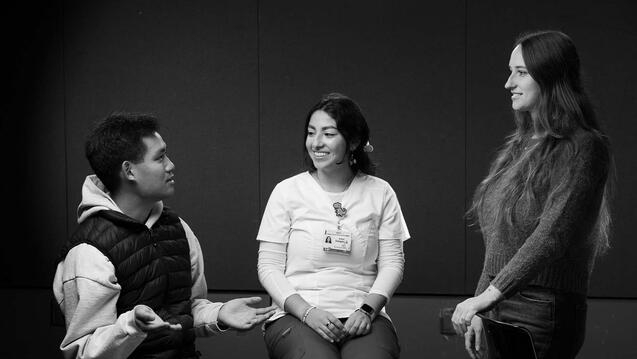A New Era

After nearly a year of leading USF School of Law as interim dean, Susan Freiwald has been named the school’s 19th dean — and its first female dean — since its founding in 1912.
Freiwald brings to the post a wealth of experience as an educator and legal scholar and a knack for forward thinking: she was writing about the law pertaining to electronic communications well before Google and Facebook were founded. She’s now a nationally recognized expert on electronic privacy, having recently published in the Harvard Law Review. Here Freiwald chats with USF Lawyer magazine about her background and what’s in store for the law school. You became an educator after clerking for a judge on the Second Circuit and then practicing securities law with a Wall Street law firm.
What led you to academia?
I wanted to spend more time studying the relationship between law and technology, a topic that had fascinated me since I was young. Also, I was able to teach two classes while in law school: a first-year legal writing class that I taught as a third year, and an undergrad sociology class for which I led a section as a teaching assistant. I was eager to get back to teaching, which I really loved. Finally, I enjoyed being on the law review, which had me immersed in legal scholarship. You’ve established yourself as an expert in privacy law.
How did you discover that passion?
I learned how to program computers during college and ended up as a software developer at Oracle for a year between college and law school. I was always interested in bridging the gap between technologists and the rest of society, and, to me, law strongly impacts how society operates. I couldn’t find any technology law courses to take at law school; my copyright law course didn't even cover the copyrightability of computer code. So I decided to follow my interests on my own and, for my third-year paper, I compared the legal treatment of computer crime, email privacy, and electronic monitoring in the workplace. Several law school professors I approached declined to oversee my paper, however, because they told me they lacked the expertise. Finally, a visiting professor, who didn’t have any expertise either but took pity on me, agreed to do it.
Given the difficulty in finding a professor to oversee the paper, did you ever consider a different topic?
It never occurred to me to switch my topic because I couldn’t imagine writing about something that didn’t compel me. When my students ask me what they should write their research papers on, I always tell them to find something that sparks their interest. Otherwise they are not going to be able to live and breathe it, which is necessary to do a good job.
Why have you continued to study this intersection of technology and the law?
The changes that new technology requires of society, and therefore of the law, happen much more quickly than in the traditional sphere. So when you study the impact of something like the internet on the law, it allows you to assess how the different parts of our legal system respond to problems, and provides insight into what our society values, into strengths and weaknesses of these parts of our legal system, and into areas needing reform.
Speaking of privacy law, what was your role in the California Electronic Communications Privacy Act (CalECPA)?
I was the academic liaison for CalECPA, which raised the standard for California entities’ access to electronic communications information to require a warrant, and incorporated significantly more judicial oversight of government surveillance practices. As a member of a small coalition of advisers to the legislative sponsors, I conducted background research, helped draft the statutory language, testified in the state legislature, and wrote and obtained support for a law professors’ letter in favor of the legislation.
Tell us about your work advocating for Fourth Amendment protection of cell site location data?
Since 2008, I have been writing about the need for courts to recognize a Fourth Amendment interest in the location data providers collect from our cell phones. I continued to argue for it as an amicus in two federal appellate cases, in 2010 and 2012, but was not successful. Finally, the Supreme Court found a Fourth Amendment privacy right in location information in 2018 in Carpenter v. United States. It was rewarding to see the Supreme Court validate my argument, and other scholars have cited my four-part test as a critical component of the Court's new approach.
What’s your sense of the focus of legal education today?
I think the California bar exam currently drives too much legal education because it requires memorizing an unnecessarily large amount of minutia. The California bar is significantly harder to pass than other state bars, with a cutoff score for passing of 144 that is well above the state average of 135 and the 133 required to pass in New York and Illinois. The mix of doctrinal learning, problem solving, and other skills that a law school teaches should be based on what best prepares graduates for success broadly, not just on one standardized test. I hope that the results of current studies help improve and modernize the California bar and that its scoring comes into line with other states.
How do you balance that as a law school?
Of course we do our best to prepare our graduates to pass the bar on their first try. At the same time, we train our students to be excellent and ethical lawyers who serve their clients well, whether those clients are individuals, companies, public entities, or the public itself. And, in accordance with our mission, we strive to instill in our graduates a concern about the well-being of others and about the pursuit of justice. We try to pass on to our students our love of the law and our appreciation of its depth so that we may help them find fulfillment as legal professionals.
What’s your vision for the law school? How are you going to lead us there?
I want to restore the law school’s luster and return us, in a modern incarnation, to a place where we are proud of our bar pass rate and all the exciting work being done by our graduates and here at the law school itself. We’ve already taken several steps. We’ve instituted changes to the curriculum, the most significant of which was increasing the units of courses devoted to bar subjects. At the same time, our faculty have been providing more individualized feedback and attention to our students to help them with their writing and other skills. We have improved our employment advising, with more individualized counseling and greater use of alumni hiring and mentoring. We are promoting our strengths more, including our groundbreaking clinics, our outstanding faculty, and our diverse, supportive, and accessible community.
What else would you like people to know about where the law school is headed?
We have come through a period of transition in the last year. Now it's time to give the myriad changes we have made some time to work, to promote what we already do well, and to refine from there. We are a team of people who are deeply committed to our tradition of improving society by graduating ethical and excellent lawyers. With the strong support of the University, the partnership and engagement of our alumni and donors, and our bright and amazing students, we are headed in a positive direction.


